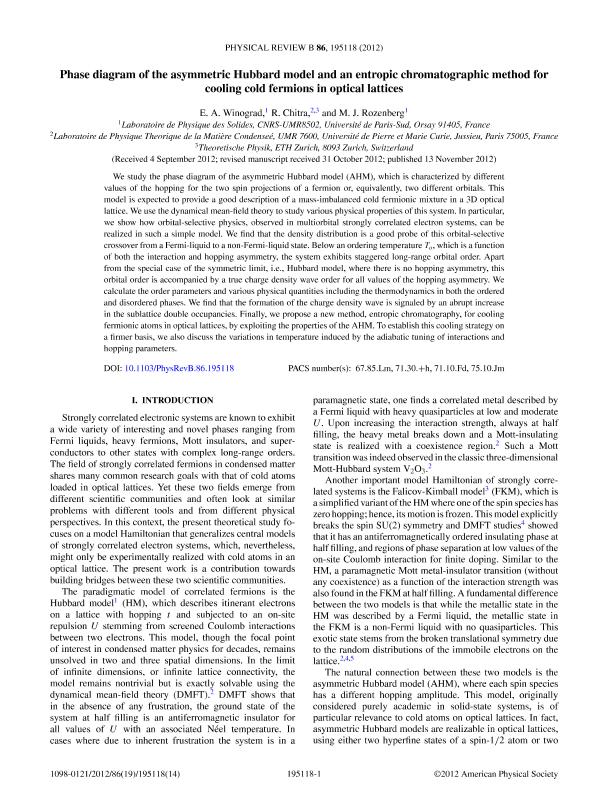Mostrar el registro sencillo del ítem
dc.contributor.author
Winograd, Emilio Andres

dc.contributor.author
Chitra, R.
dc.contributor.author
Rozenberg, Marcelo Javier

dc.date.available
2018-08-17T15:50:05Z
dc.date.issued
2012-08
dc.identifier.citation
Winograd, Emilio Andres; Chitra, R.; Rozenberg, Marcelo Javier; Phase diagram of the asymmetric Hubbard model and an entropic chromatographic method for cooling cold fermions in optical lattices; American Physical Society; Physical Review B: Condensed Matter and Materials Physics; 86; 19; 8-2012; 1-14
dc.identifier.issn
1098-0121
dc.identifier.uri
http://hdl.handle.net/11336/56131
dc.description.abstract
We study the phase diagram of the asymmetric Hubbard model (AHM), which is characterized by different values of the hopping for the two spin projections of a fermion or, equivalently, two different orbitals. This model is expected to provide a good description of a mass-imbalanced cold fermionic mixture in a 3D optical lattice. We use the dynamical mean-field theory to study various physical properties of this system. In particular, we show how orbital-selective physics, observed in multiorbital strongly correlated electron systems, can be realized in such a simple model. We find that the density distribution is a good probe of this orbital-selective crossover from a Fermi-liquid to a non-Fermi-liquid state. Below an ordering temperature T o, which is a function of both the interaction and hopping asymmetry, the system exhibits staggered long-range orbital order. Apart from the special case of the symmetric limit, i.e., Hubbard model, where there is no hopping asymmetry, this orbital order is accompanied by a true charge density wave order for all values of the hopping asymmetry. We calculate the order parameters and various physical quantities including the thermodynamics in both the ordered and disordered phases. We find that the formation of the charge density wave is signaled by an abrupt increase in the sublattice double occupancies. Finally, we propose a new method, entropic chromatography, for cooling fermionic atoms in optical lattices, by exploiting the properties of the AHM. To establish this cooling strategy on a firmer basis, we also discuss the variations in temperature induced by the adiabatic tuning of interactions and hopping parameters. © 2012 American Physical Society.
dc.format
application/pdf
dc.language.iso
eng
dc.publisher
American Physical Society

dc.rights
info:eu-repo/semantics/openAccess
dc.rights.uri
https://creativecommons.org/licenses/by-nc-sa/2.5/ar/
dc.subject
Cold Atoms
dc.subject
Optical Lattices
dc.subject
Strongly Correlated Electron Systems
dc.subject.classification
Astronomía

dc.subject.classification
Ciencias Físicas

dc.subject.classification
CIENCIAS NATURALES Y EXACTAS

dc.title
Phase diagram of the asymmetric Hubbard model and an entropic chromatographic method for cooling cold fermions in optical lattices
dc.type
info:eu-repo/semantics/article
dc.type
info:ar-repo/semantics/artículo
dc.type
info:eu-repo/semantics/publishedVersion
dc.date.updated
2018-08-13T18:29:28Z
dc.journal.volume
86
dc.journal.number
19
dc.journal.pagination
1-14
dc.journal.pais
Estados Unidos

dc.journal.ciudad
Nueva York
dc.description.fil
Fil: Winograd, Emilio Andres. Consejo Nacional de Investigaciones Científicas y Técnicas; Argentina
dc.description.fil
Fil: Chitra, R.. Universite Pierre et Marie Curie; Francia
dc.description.fil
Fil: Rozenberg, Marcelo Javier. Consejo Nacional de Investigaciones Científicas y Técnicas. Oficina de Coordinación Administrativa Ciudad Universitaria. Instituto de Física de Buenos Aires. Universidad de Buenos Aires. Facultad de Ciencias Exactas y Naturales. Instituto de Física de Buenos Aires; Argentina
dc.journal.title
Physical Review B: Condensed Matter and Materials Physics

dc.relation.alternativeid
info:eu-repo/semantics/altIdentifier/url/http://prb.aps.org/abstract/PRB/v86/i19/e195118
dc.relation.alternativeid
info:eu-repo/semantics/altIdentifier/doi/http://dx.doi.org/10.1103/PhysRevB.86.195118
Archivos asociados
